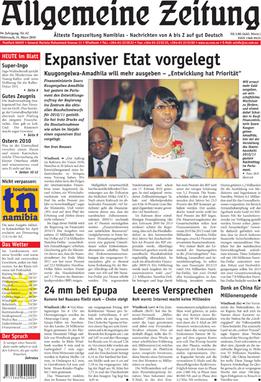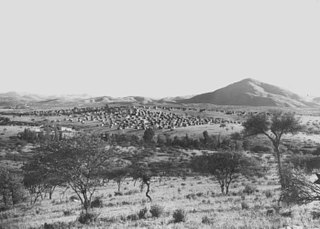
Radio DDR 1 was a radio channel produced and transmitted by Rundfunk der DDR, the radio broadcasting organization of East Germany (GDR). It had a mixed of news and light entertainment schedule, with an emphasis on events in the GDR, and also included regional programming.

Staßfurt (Stassfurt) is a town in the Salzlandkreis district, in Saxony-Anhalt, Germany. It is situated on both sides of the river Bode, approximately 15 km (9.3 mi) northeast of Aschersleben, and 30 km (19 mi) south of Magdeburg. Pop. (2005) 23,538.

Cassinga or Kassinga is a town and commune in the municipality of Jamba, province of Huíla, Angola.
John Alphons Pandeni was a Namibian politician and trade unionist. A member of SWAPO, Pandeni was Minister of Regional and Local Government, Housing and Rural Development at the time of his death in 2008.

Deutscher Fernsehfunk was the state television broadcaster in the German Democratic Republic from 1952 to 1991.
Lieutenant General Mweukefina Kulaumone Jerobeam Dimo Hamaambo was a Namibian military commander in both the Namibian War of Independence as a SWAPO member and in independent Namibia as the Chief of Defence in the Namibia Defence Force. He became the second commander of the People's Liberation Army of Namibia (PLAN) in 1967 after the death of Tobias Hainyeko and held the position until independence was gained in 1990.

The Allgemeine Zeitung founded in 1916, is the oldest daily newspaper in Namibia and the only German-language daily in Africa to survive World War I.
Kazenambo Kazenambo, commonly known as KK, was a Namibian politician.

The Old Location was an area segregated for Black residents of Windhoek, the capital of Namibia. It was situated in the area between today's suburbs of Hochland Park and Pioneers Park.

German South West Africa was a colony of the German Empire from 1884 until 1915, though Germany did not officially recognise its loss of this territory until the 1919 Treaty of Versailles.

German South West Africa was a German colony in Africa, established in 1884 with the protection of the area around Lüderitz and abandoned during World War I, when the area was taken over by the British.

Parliamentary elections were held in South West Africa between 4 and 8 December 1978. These first elections conducted under universal adult suffrage—all previous elections had been Whites-only—were won by the Democratic Turnhalle Alliance, which claimed 41 of the 50 seats. The elections were conducted without United Nations (UN) supervision, and in defiance of the 1972 United Nations General Assembly's recognition of the South West African People's Organisation (SWAPO) as the "sole representative of Namibia's people". The UN henceforth declared the elections null and void. The resulting government, dependent on South African approval for all its legislation, was in power until its dissolution in 1983.
Delta Secondary School Windhoek (DSSW) previously known as Deutsche Oberschule Windhoek, is a government secondary school in Namibia. Situated in the capital Windhoek, it was separated from its younger counterpart Delta School Windhoek (DSW), formerly known as German School Windhoek, in January 1975.
Ottilie Grete Abrahams was a Namibian educator, activist, and politician.

Namibia is a multilingual country in which German is recognised as a national language. While English has been the sole official language of the country since 1990, in many areas of the country, German enjoys official status at a community level. A national variety of German is also known as Namdeutsch.
Gerson Hitjevi Veii was a Namibian politician. Veii was founder member of the South West Africa National Union (SWANU) and its president from 1968 to 1982. After Namibian independence he was the first governor of Kunene Region.

Sylvia Bretschneider was a German teacher, education administrator and politician (SPD). She was a member of the Landtag of Mecklenburg-Vorpommern between 1994 and 2017, taking over as speaker of the state parliament in 2002, and serving in that office, formally, till her death.

Kerry McNamara was a Namibian master architect and anti-Apartheid activist.
Rear Admiral Alweendo Paulus Amungulu is a Namibian military officer who's serving as the Commander of the Namibian Navy. He was appointed the Commander of the Namibian Navy in September 2020. Prior to that he served as Commander of Naval Operations(CNO) with the rank of Rear Admiral(JG).

Ndeutala Angolo, also known as NdeutalaSelma Hishongwa and Ndeutala Angolo Amutenya, is a Namibian writer and political activist.
![Bellin Castle [de] Bellin173 DSC0153.JPG](http://upload.wikimedia.org/wikipedia/commons/thumb/7/73/Bellin173_DSC0153.JPG/220px-Bellin173_DSC0153.JPG)












